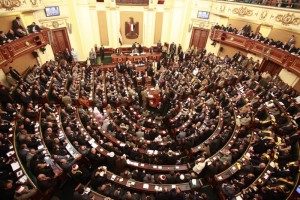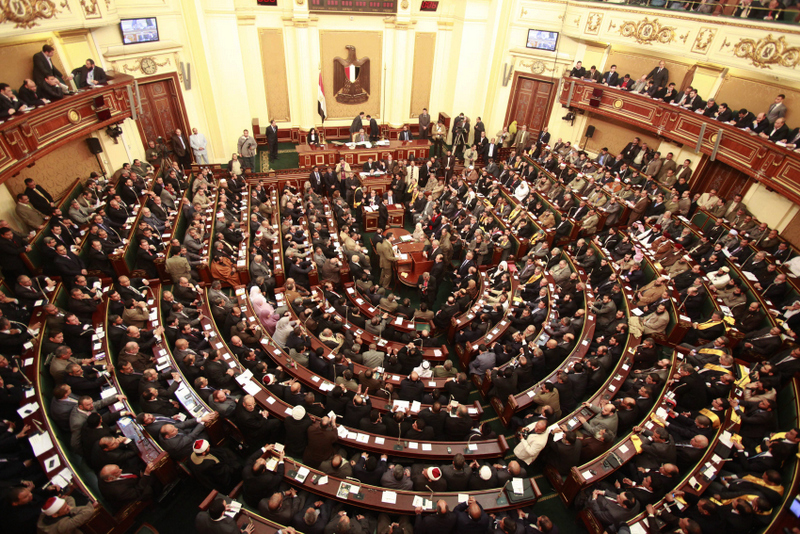
(AFP File Photo)
President Abdel-Fattah Al-Sisi ratified the electoral districts law Monday, establishing the basis for upcoming parliamentary elections.
The parliamentary elections represent the third and final phase of the transitional roadmap set out after the July 2013 regime change.
The law, drafted by the Electoral Districts committee, sets the number of Egypt’s districts at 237 for individual candidates, with another four reserved for party list seats.
The upcoming parliament will have a total of 567 seats, and will be split according to the type of representative standing, with the vast majority reserved for independent candidates, rather than party-affiliated individuals.
Independents will be allowed to stand in 420 seats, 120 will be designated for party-based candidates, while 27 will be set aside for presidential appointees. The numbers have been stipulated by another elections law, issued by former interim president Adly Mansour in June.
No solid date has been set for the upcoming elections, but statements from the presidency have maintained they will be held in the first quarter of 2015.
However, a panel of high-profile political commentators spoke on Monday night to criticise the new regulations. The talk, held at the Cairo Institute for Human Rights Studies (CIHRS), raised issues of representation in the new system’s design and its expected political effect, and also questioned the constitutionality of the law itself.
Amr Hisham Rabi, Deputy Director of the Ahram Institute for Political and Strategic Studies, raised concerns over the nature of the drafting procedure. Rabi claims that parties were absent from the process, with a technical committee instead putting the regulations together, ignoring party submissions.
“We submitted many recommendations to make the system more proportional, but they were rejected, good alternatives that would safeguard the representation of minorities like women and Copts…the new system will be 100% majoritarian,” Rabi said.
Rabi said he had studied the new districts, and found that 16 of them will be less represented than in the previous parliament. He added that he also thought it was “strange” that some constituencies will elect more than one candidate.
According to the law, from the 241 districts, 123 will elect two candidates, 84 will elect one, and the remaining 34 will elect three. Such designs mean that in some districts, a candidate may be able to win with around 100,000 votes, whereas in others up to 400,000 may be necessary, said Rabi, noting that this would contravene Article 102 of the constitution, which guarantees the “fair representation of the population and governorates and equitable representation of voters”.
“The new electoral districts law guarantees balanced representation,” Minister of Transitional Justice Ibrahim El-Henedy said mid-December, in the face of controversy over the regulation. “The panel tasked with drafting the parliamentary election districts law has taken into account a balanced and fair representation of seats in proportion to the number of voters in a given electoral district.”
Referring to the 73% of seats reserved for non-party candidates, Rabi said: “It will be like a local council because of the independents. They will have no interest in politics, only in issues like new bridges and local services”.
The panel members agreed that it will facilitate the emergence of old networks and businessmen associated with the Mubarak-era.
“The committee has been afraid of the Muslim Brotherhood and protest movements, so [it] has drafted the law with this in mind, to marginalise them,” he stated.
For Khaled Dawoud, spokesperson of the liberal Al-Dostour Party, the laws reflects a will on Al-Sisi and the government’s part not to have real democracy.
“We’ve been ruled by one party since the 1950s. Like many parties, the Al-Dostour Party only started two years ago. With the restrictive regulations on the upcoming elections, the parliament won’t be different to 2010, we’ll see the return of the same faces,” he said.
It is a sentiment shared by various political parties, even those supportive of the Al-Sisi presidency. In a previous interview with Daily News Egypt, Hossam Al-Kholy, spokesperson for the Al-Wafd Party said: “With so many seats reserved for individuals, it will stop a strong movement of political parties.”
With parties unable to develop into complex organisations, the bigger issues will be left to the executive (the President), and so parliament will become easier to control, he argued.
CIHRS recently announced its intention to move the majority of its work abroad in light of the current hostile atmosphere towards civil society organisations in Egypt. Ahmed Fawzi, Secretary General of the Egyptian Social Democratic Party, began his speech at the panel by decrying the loss of the organisation: “Civil society is being punished by those who benefitted from the Mubarak-era for uncovering corruption. Which politician or public figure responded to the death of NGOs? I suspect they are happy.”
“There is no intention for the parliament to have any power. Peaceful participation in government is taboo… Parties are even being excluded from the vote itself; it’s like it is being held in secret. We’re not being given any dates; how are we supposed to prepare for them?” he continued.
“I wish that the Muslim Brotherhood could run, because that would legitimise the revolution. Now we are excluding and suppressing groups from the political system… What is the state of political representation now? You can demonstrate and end up in jail or you can go join Daesh [ISIS]” he said.
However, Fawzi did express hope for the coming years, despite the current situation looking dim: “The problems now are a failure of the revolution. However, we did succeed in connecting in people’s mind the political system with their lives. Those who elected Sisi began to criticise him not long after, when power cuts hit the country.”
The first two steps of the roadmap set at the time of the ouster of former Islamist president Mohamed Morsi’s in 2013 were the passing of a new constitution and presidential elections, both of which were completed in 2014.



